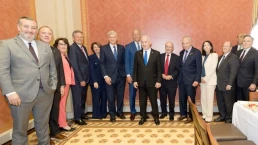By Daniel Falcone, Truthout
Joint Chiefs of Staff Chairman Gen. Mark Milley recently called China’s testing of a hypersonic missile designed to evade U.S. nuclear defenses “very close” to a “Sputnik moment” for the United States. The comments underscore an ongoing pattern on the part of the U.S. government and corporate media structure that reinforces and instigates dangerous preexisting geopolitical tensions with China, a rhetorical theme unnecessarily produced by a Sinophobic bipartisan U.S. political elite.
In this interview, international relations scholar Richard Falk provides the historical context of Sputnik and summarizes U.S. interests in promoting a culture of fear with China. Falk also outlines how prospects for a new Cold War could ultimately subside due to increased focuses about the climate emergency and COVID, thus rendering geopolitics less relevant, which is both fortunate and unfortunate for its own sets of reasons.

Daniel Falcone: On Bloomberg Television, Gen. Mark Milley referred to China’s hypersonic weapons test as close to a “Sputnik moment” that has our attention. Can you comment on the meaning of this language and provide historical context?
Richard Falk: I interpret General Milley’s remark as primarily intended to raise security concerns relating to the deepening geopolitical rivalry with China, or perhaps as a reflection of these. To call the hypersonic weapons test by China “close to a Sputnik moment” was suggesting that it was posing a systemic threat to American technological supremacy directly relevant to national security and the relative military capabilities of the two countries. The reference to a Sputnik moment was a way of recalling an instance when the geopolitical rival of the day, which in 1957 was of course the Soviet Union, suddenly caught the U.S. by surprise, becoming the first sovereign state with the capacity to send a satellite into space with an ability to orbit the Earth, and possibly in the future by this means dominate the political life of the entire planet.
Recent Posts
What To Do When You See ICE In Your Neighborhood
July 14, 2025
Take Action Now How can you deter the Trump administration’s immigrant deportation machine when it pops up in your community? Follow these…
ICE Campaign Of Violence Will Lead To More Deaths
July 14, 2025
Take Action Now Jaime Alanis’s death shows the horrific consequences of a secret police force behaving with utter impunity.By Natasha Lennard, The…
Hague Group: “Concrete Measures” or Sack of Cement? Will It Move to Sanctions, Peace Force and Ensuring Aid to Gaza?
July 13, 2025
Take Action Now Will the meeting in Colombia be a coalescence of global opinion driving states to just action — or just more rhetoric from various…
Why Are Democratic Lawmakers Still Meeting With Netanyahu?
July 12, 2025
Take Action Now Pictures show Democrats like Chuck Schumer standing next to Netanyahu, smiling.By Sharon Zhang, Truthout A bipartisan group of…




